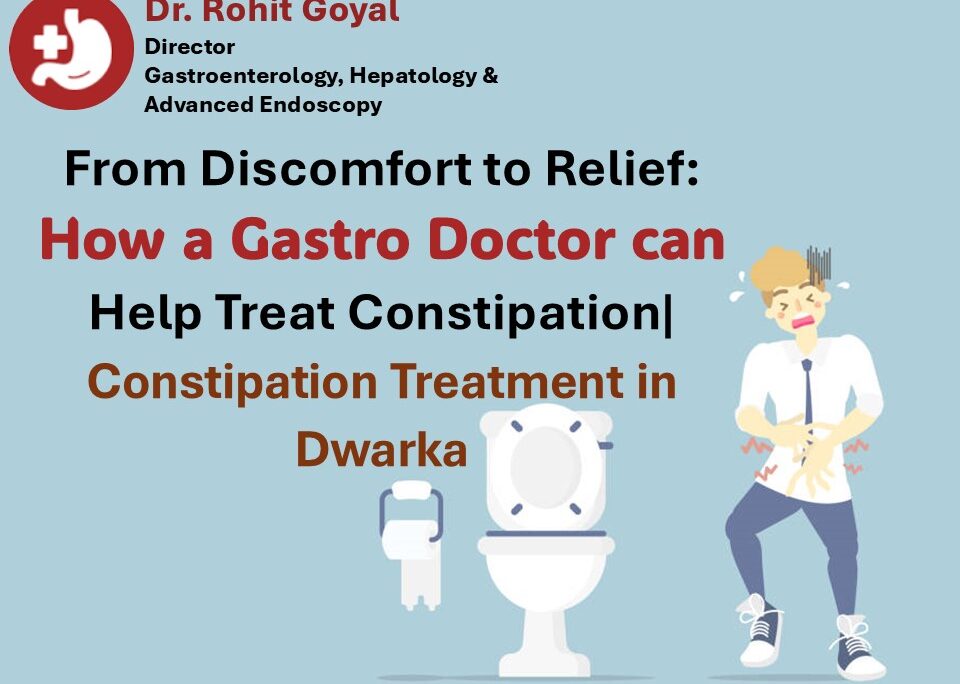How to Manage Constipation Naturally & Medically
Constipation is one of the most common digestive issues affecting individuals across all age groups. It can be uncomfortable, frustrating, and at times, even painful. Many patients visit gastroenterology clinics struggling with irregular bowel movements and uncertainty about how to manage the condition.
This blog explores a combination of natural remedies and medical treatments that can help relieve constipation and support overall gut health.
Understanding Constipation
Constipation is typically defined as having fewer than three bowel movements per week, often accompanied by hard, dry stools, difficulty passing stools, or a sense of incomplete evacuation. Several factors may contribute to this condition, including poor dietary habits, lack of physical activity, dehydration, and certain medications.
Naturally Remedies to Relieve Constipation
Constipation is a common digestive concern that can affect people of all ages. As any stomach specialist or gastroenterologist would agree, maintaining healthy bowel habits is key to overall digestive well-being. While medication can sometimes be necessary, many cases of constipation can be effectively managed with simple, natural remedies. Here are some tips to help promote regularity and improve your gut health:
1.Increase Fiber Intake
Dietary fiber adds bulk to the stool and helps it pass more easily. Incorporating fiber-rich foods like fruits, vegetables, whole grains, and legumes into daily meals can make a significant difference.
2. Stay Hydrated
Drinking enough water throughout the day softens stool and supports regular bowel movements. Aim for at least 6-8 glasses of water daily. Unless otherwise directed by a healthcare professional.
3. Exercise Regularly
Physical activity stimulates intestinal function. A simple daily routine of walking, yoga, or light exercise can promote better digestion and improve bowel regularity.
4. Establish a Routine
Encouraging the body to follow a regular schedule for meals and bathroom visits can help train the bowel for more predictable activity.
Medical Treatments for Constipation
A gastro doctor plays a vital role in managing constipation when lifestyle changes alone do not provide sufficient relief. Medical interventions are often needed to address persistent or severe symptoms effectively. These may include:
- Over-the-counter Laxatives: Options like bulk-forming agents (e.g., psyllium), osmotic agents, and stool softeners can be used under medical guidance.
- Prescription Medications: In chronic cases, a doctor may recommend medications such as elobixibat, lubiprostone or linaclotide that promote intestinal fluid and movement.
- Addressing Underlying Conditions: Conditions like hypothyroidism, diabetes, or irritable bowel syndrome may contribute to constipation and need specific treatment plans.
When to See a Gastroenterologist
Urgent consultation from a gastroenterologist near you is essential if one or more of the following alarm symptoms are present with constipation:
- Worsening severe constipation
- Rectal bleeding
- Severe abdominal pain
- Weight loss
- Lump or masses in abdomen
- Suspected underlying issues such as IBS, hypothyroidism, or medication side effects.
FINAL THOUGHTS
Constipation is a common yet often underestimated issue that can significantly affect your overall well-being. Most cases can be managed effectively through Natural Remedies, such as increasing dietary fiber (High Fiber Diet), Staying well-hydrated (Hydration Matters), maintaining a Healthy Lifestyle, and adopting consistent bowel habits. These steps not only promote Constipation Relief but also support long-term Digestive Health and Gut Health.
However, if symptoms persist or worsen, it’s essential to seek expert Gastroenterology Care. Dr. Rohit Goyal, a leading gastroenterologist near Dwarka, specializes in diagnosing and treating chronic digestive ensures better outcomes and prevents potential complications, reinforcing the importance of preventive Health.













